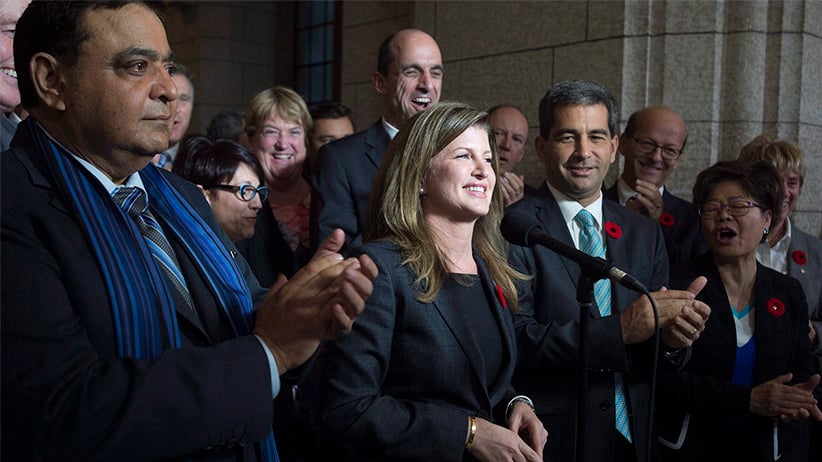The Tories may be down. But they’re definitely not out.
The Conservatives lost at the polls, but they’re well-positioned to come storming back. Martin Patriquin explains why.
Share

One of the many benefits of not living and working in Ottawa—but being interested in federal politics nonetheless—is that it’s akin to watching a car crash from afar: all the thrills, none of the gory details. Given enough time, governments inevitably become what they hate, and from this privileged Quebec perch I watched Brian Mulroney’s Conservatives go from staunch critics of Ottawa’s orgy of patronage to the feckless maître d’ of said orgy.
I watched the Liberals take power on the ensuing wave of indignation, only to peter out via a shabby ploy to sell Quebecers on the merits of the Canadian flag by way of criminally over-compensated businessmen from that province. Finally, I watched the Harper government rise on promises of an “open and accountable government”, only to become the cynical, paranoid and almost clownishly mean-spirited version that lost power three months ago.
In each case, new governments rose to power by forcing the previous into political oblivion. In the case of Mulroney’s Conservatives, it took the disaster of Kim Campbell and Jean Charest’s palliative touch before being plucked from its deathbed by the Reform Party’s righteous prairie populism. The Liberals, meanwhile, needed 10 years and four leaders before hitting upon the alchemy of hair and hope we have before us today.
History, though, won’t likely be repeating itself with the current iteration of the Conservative Party. In fact, despite its well-deserved electoral drubbing, the Conservatives are better poised to face the juggernaut of Justin Trudeau in 2016—and ultimately benefit when his government goes the way of others over time.
This is mostly due to current political realities. Simply put, the Conservatives will have a gold mine of bad news to plunder in the coming months. First and foremost, the long hangover wrought by low oil prices will sting all the more as EI payments continue to dry up for oil patch workers, and companies shelve expansions planned during the giddy days of $110 oil. Of course, blaming a sitting government for the price of oil is absurd; you might as well blame the guy who clacks spoons to music outside of Oglivy’s in Montreal. Yet doing so is political old-hat, if only because it works.
The associated misery from low oil also provides a decent cudgel with which to hammer away at the Liberal government’s policy planks. Instituting a national carbon reduction strategy is difficult work; doing so at sub-$40 oil is damn well near impossible, largely because the Conservative’s enduring (and highly questionable) economy-or-environment equation becomes far less questionable, politically speaking, with the west’s economy in a funk.
Related: The death of the Alberta dream
In this department, the Conservatives have a ready and strong ally in Brad Wall. The Saskatchewan Premier is popular, well-spoken and the lone conservative provincial leader can voice apprehension about Syrian refugees without sounding like a mouth-breather. More importantly, he’s the face of oil-patch obstinacy to the Liberal government’s environmental plans—particularly as he goes into an election campaign of his own.
Then there is the Conservative Party itself. It has seemingly taken its electoral loss with the requisite humility, with interim leader Rona Ambrose admitting the party was woefully deficient in its attempts to woo anyone but straight, white suburban and rural males to its corner. Contrast this with the Republican Party, which came to same conclusion following Mitt Romney’s 2012 defeat—only to embark on the hateful parade playing out today.
Case in point: Conservative criticism of the Liberal Syrian refugee plan has been mostly economic, with precious little of the fear-mongering we’d come to expect under its previous incarnation.
In truth, the Conservatives needn’t be so humble. Despite a rudderless 2015 campaign and 10 mostly mean-spirited years as precedent, the party received nearly 32 per cent of the vote. This is just nine points short of the Liberals, and double the NDP score. According to Elections Canada data, the Conservatives raised nearly 24 million in the first three quarters of 2015 alone—about eight million more than the Liberals. Finally, Stephen Harper may be gone but his party’s institutional enmity for all things Liberal remains. Ugly as it may be, this enmity can be hugely motivational when properly packaged. To her great credit, Ambrose seems to understand this.
Given time and perhaps one more electoral success, the current Liberal government will become what it hates. We’ve already seen hints of it four months in. While in opposition, Liberal brass pilloried the Conservatives for allowing the sale of military vehicles to Saudi Arabia. In government, the Liberals have become the sale’s chief apologist, if only because the military vehicles in question are manufactured in a key political battleground.
Justin Trudeau’s entrance into office came with a volley of visiting lobbyists; in the last few days, his office has ceased giving details about who exactly those lobbyists are. Sunny Ways notwithstanding, the two-party, boom-and-bust cycle that is Canadian federal politics will continue. And the Conservative Party is better placed to benefit than its most recent failure would suggest.
Related: How Rona Ambrose is setting the tone for the next leader